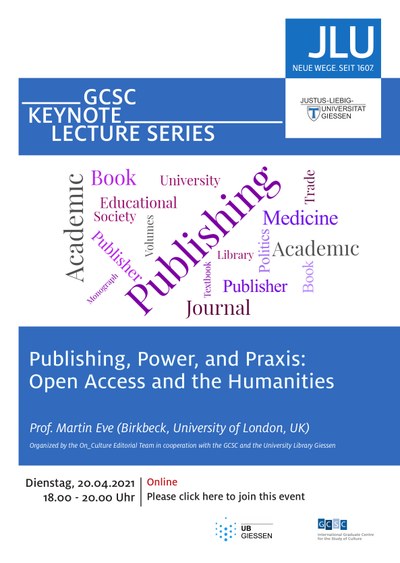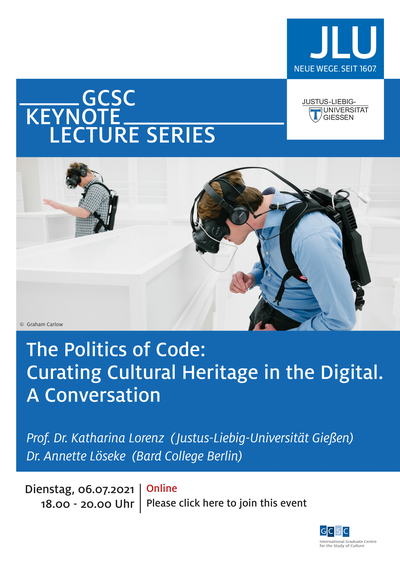SoSe 2021: The Role of the Digital in the Study of Culture. New Horizons, Potentials, Challenges.
Martin Eve (Birkbeck, University of London, UK)
Publishing, Power, and Praxis: Open Access and the Humanities
20.04.2021, 18.00-20.00, online
Academic publishing, a core part of any research activity, has become, in recent years, a highly politicised act. Boycotts have arisen against the major publishers – and particularly Elsevier – over claimed monopolistic practices. At the same time, the rise of open-access (OA) publishing has presented a series of social and economic challenges that are still unresolved. While it appears to yield great promise of universal access, for many researchers, the increasing number of mandates for open-access from centre-right governments appears to betray the argument that this form of dissemination could be of greater ethical import. Coupled with high article processing charges, OA appears emptied, in many ways, of any of its political force.
In this talk, Martin Paul Eve will talk about the ongoing debates around open-access publishing; the core challenges for the humanities disciplines in achieving better levels of access; and the implications of open, digital forms for the future of the scholarly monograph.
See the recording in our Video Archive
Erik Born (Cornell University, USA)
The Digital University: Switches, Binaries, Polarization
25.05.2021, 18.00-20.00, online
To counter the narrative that the global pandemic merely accelerated an inevitable digital transition, we need a foundational critique of the mutual entanglements among higher education and media technology over the longue durée. This talk distills switches, binaries, and polarizations in ongoing debates about the “idea of a university,” putting a materialist theory of the university as a media system in dialogue with recent work in critical university studies. Even if the key social aspects of the digital order consist in automation, interactivity, and interconnectivity, it remains unclear whether a truly “free” and “open” university is possible in the digital age.
In this talk, Erik Born will examine the shifting historical alliances among the university, the book market, and the nation-state. Drawing on media history and theory as well as the emergent field of critical university studies, the talk aims to provide a space for discussing digitization and academic labor.
See the recording in our Video Archive
Dorothee Birke (Norwegian University of Science and Technology, Norway)
Booktube and co.: An Introduction to Reading Culture on Social Media
01.06.2021, 18.00-20.00, online
We often hear that in the age of the digitalization, people no longer read books. What this juxtaposition of “online culture” and “book culture” ignores, however, is the fact that there is a growing group of readers who combine “old” and “new” media practices and use social media to structure and communicate their lives as book lovers. This talk presents the example of BookTube – a group of YouTube channels – in order to discuss how literary reading is `done` on social media. Which affordances of BookTube do the practitioners utilize for their reading? Does the printed book as an object still play a role in this context? To what extent do social media transform literary reading into a more social activity? And how does this relate to long-standing reading practices?
Join the lecture to find out more about the world of online book culture – and on the way reflect about your own reading practices in the age of digitalization.
See the recording in our Video Archive
Annette Löseke (Bard College Berlin) & Katharina Lorenz (JLU)
The Politics of Code: Curating Cultural Heritage in the Digital. A conversation
06.07.2021, 18.00-20.00, online
In our exchange, we want to explore opportunities and challenges that come with employing digital technologies for presenting and facilitating engagement with cultural heritage. We will examine some of the curatorial and usage strategies at play at the Pergamon Museum in Berlin. Specifically, we will compare the historic reconstructions of the Pergamon Altar as they were and are displayed in the gallery with the current stand-alone, digitally-enabled Pergamon Panorama exhibition. Our aim is to tease out the respective capacities of analogue and digital exhibits for scaffolding immersion and interplay, pinpoint the curatorial blind spots that impact engagement with these displays, consider how these different settings shape highly politicised spaces, and experiment with alternative forms for presenting (contested) cultural heritage in the digital.




